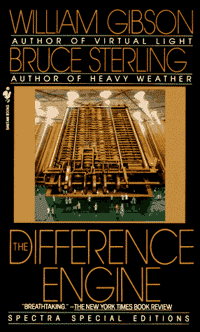
Photo from LexMachina's Flickr photostream.
Sometimes I can reverse-psychologize myself into liking things. The best way to work this trick is to play on my natural tendency to be a devil's advocate, to root for the underdog. Reading reviews makes me picture The Difference Engine as one such underdog. There are a few common complaints that are already making me raise eyebrows, and the theory is that, if I can point out how those expectations or confusions are unrealistic, I'll feel allied with the book before I even begin.
(Caveat: This might be highly unfair to the book, or myself, or the experience of reading in general. I'm still mulling over the moral implications.)
Often reviewers decry the glossing-over of the changes in technology that the entire plot springs from. This is where some history lessons are useful: Charles Babbage tried to design the first computer, a mechanical device that would perform advanced mathematical calculations. We're not talking "computers" here, no microchips or binary or circuit boards; this engine was operated by a hand crank. The original design failed, and government funding was withdrawn when the project became too expensive to support. An improved design, the Difference Engine No. 2, was used as reference material by rival inventors. A century and a half later, modern scientists were able to build a successful Difference Engine No. 2. Some "minor errors" were found in Babbage's schematics, but the machine was fully operational by the end.
So you see, I can't imagine this novel not glossing over the details of the technology. A world where Babbage's ideas worked is impossible. Impossible. It didn't work because he couldn't make it work and this is indicative of the state of his entire culture. In order to write about an alternative culture, truth needed to be discarded.
The point of a "historical reimagining" is that we're suspending our disbelief for a while and allowing ourselves to go along with an assumption. Sometimes we like to call these axioms: things that may or may not be true, but will lead to fun outcomes if we follow along with them. They're the basis of philosophy, of arguments, of fiction. I don't think I have to mention that Gibson and Sterling are writers, not scientists - their jobs are to predict and theorize about the way things affect daily life. I'm relatively mechanically inclined but I doubt I could summarize the difference engine's mathematical functions in layman's terms. And why should I have to?* Why should they have to spend more than a succinct paragraph or two describing how the machines work when the real story is in how people's lives change around them? Borges never had to explain how The Library or The Lottery really worked, because he was too busy telling us important, mind-blowing things about how society worked in those situations. And those stories are the best in the world.
- Allana
*Of course, I'll probably try at some point, because why not?
Known Issues, part one.
Written by Allana on Monday, March 29, 2010
Subscribe to:
Post Comments (Atom)




It's interesting to me that you tread cautiously around a perceived moral dimension to reading a book. That you seem to be saying there is a kind of ethics governing your mindset when you open yourself to something someone has written.
ReplyDeleteThat's certainly true if you are approaching the work as a reviewer, as the fact that you're about to make public your opinion of the book (or, more accurately, your impressions of the experience of reading the book... your perception of the effectiveness of the communication of the author's intent via the medium of the book...) obliges you to approach the exchange as free of preconceptions and with as much honesty as possible.
But I guess it's even a valuable code of behavior when you are just reading for yourself. It's a constructive discipline of mind. Sort of like the part in the Boy Scout oath about swearing to stay "Mentally Awake". You want to avoid lazy presumption or inattention in your reading, not only out of respect for the author but out of respect for yourself. You're about to assign hours of your mentation to the words this person wrote, and you only have so many of those hours. It's kind of a self-destructive crime to be less than awake in your reading.
That's almost certainly overthinking the whole thing, but the morality of creative engagement is something I worry about too!
It's hardly overthinking. In publishing criticism, there's a respect to yourself as far as trusting your own instincts, and a respect to your readers - acknowledging that you've got a limited space and have to pare down your ideas to fit that space, which means not every sentence can start with "It seems to me" or "It just may be my opinion" or "Given what little I know about the topic." I get angry when people insist that writing criticism has to involve portraying a person with ultimate authority and confidence - but this leads into Known Issues, part two. (But we've got unlimited space here and certainly enough energy to publish whatever thought comes across our minds, so I'm hoping these won't be a big deal. And we don't have any profit or manipulation in mind; we're just here to ramble as much as we can. That's honesty to me.)
ReplyDeleteThe question of respecting the author's work is another one - simply by paying them attention at all, especially with the sort of enthusiasm we seem to have, has to be a compliment of some sort. Only the most narcissistic authors would insist on their audience doing their readings in a particular way or with an ideal set of tools and experience. These things get really touchy with live artistic forms (the artist controls the environment and maybe even the audience, and you go in with a much stronger suspension of disbelief), but when it comes to books there's an implicit freedom. There's much greater chance involved, as to whether reading in the bathtub or on the bus will lead to a stronger attention span or a weaker one. I like to think that authors acknowledge this. (Think: Even the premise of this blog - "Couldn't finish it the first time" - is so rare in other arts. Couldn't watch all of a two-hour movie? Even a six-hour movie? Couldn't stare at the painting long enough? Couldn't listen to the whole album? The greater investment of time and motivation in books is universally known.)